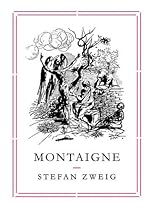Montaigne (Pushkin Collection)

| Author | : | |
| Rating | : | 4.31 (755 Votes) |
| Asin | : | 1782271031 |
| Format Type | : | paperback |
| Number of Pages | : | 160 Pages |
| Publish Date | : | 2014-10-14 |
| Language | : | German |
DESCRIPTION:
Zweigmania seems to break out with the publication of each book, with readers discovering his work by word-of-mouth and by accident' - Guardian'Zweig's life and work tell of the perilous flimsiness of our world of security-a message that many insistently deny, but somehow need to hear' - John Gray, New Statesman. "Thanks to Stone's assiduous translation, Zweig's fascinating meditation on the writer in whom he saw himself mirrored appears now for the first time in English. Zweig weaves biographical elements into his study—Montaigne's study of Latin at age four, his retirement from his public duties as a French nobleman at
He studied in Berlin and Vienna and was first known as a poet and translator, then as a biographer. He eventually settled in Brazil, where in 1942 he and his wife were found dead in an apparent double suicide. Stefan Zweig was born in 1881 in Vienna, into a wealthy Austrian-Jewish family. In 1934, with the rise of Nazis
Zweig explains Montaigne Timothy S. Chamberlain I ordered it more for Stephan Zweig than Montaigne. Zweig's presentation gave me a better understanding of Montaigne. Why he wrote in the way he did. Why he focused on certain topics. Also, re-awakened me to the woman that helped edit his Essays: Marie Le Jars de Gournay.. "Engaging biography of an interesting man" according to Susan Drees. Thank you to Pushkin Collection for re-publishing Stefan Zweig's biography of Montaigne. Zweig's personal, somewhat casual, yet highly informed style of writing for biography totally engaged me in Montaigne's life and also led me to a renewed wish to read the Essays sooner rather than later. In this current age of vile and petty discourse, I enjoyed the call to searching for "knowing the self." Very little of this is in evidence in the public forum today leaving Montaigne's wish for solitude so understandable. Also his wish for travel in order to know as many people and customs different from himself and those h
Zweig draws strong parallels between Montaigne's age, when Europe was torn in two by conflict between Catholicism and Protestantism, and his own, in which the twin fanaticisms of Fascism and Communism were on the verge of destroying the pan-continental liberal culture he was born into, and loved dearly. Just as Montaigne sought to remain aloof from the factionalism of his day, so Zweig tried to the last to defend his freedom of thought, and argue for peace and compromise. One of the final works Zweig wrote before his suicide, this is both a brilliantly impassioned portrait of a great mind, and a moving plea for tolerance in a world ruled by cruelty.. Written during the Second World War, Zweig's typically passionate and readable biography of Michel de Montaigne, is also a heartfelt argument for the importance of intellectu
